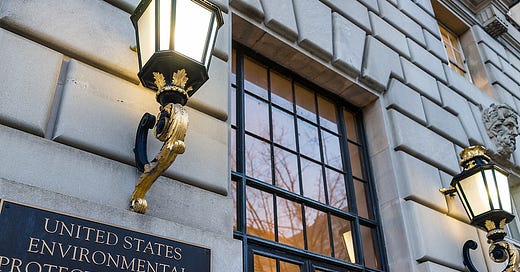The Donora Death Fog of 1948 was the most recent air pollution disaster in the United States. (Shameless Plug: Read all about it in my book, Donora Death Fog: Clean Air and the Tragedy of a Pennsylvania Mill Town.) The disaster led to the Clean Air Act we know today and the creation of the Environmental Protection Agency (EPA). That agency is now under attack by the current administration.
Let’s take a look at the history of the EPA and why we continue to need its vital services.
The little town of Donora, Pennsylvania, about 30 miles south of Pittsburgh, was once home to the largest and most modern zinc production plant in the world. The town was also home to a huge steel and wire complex, along with two enormous blast furnaces for breaking down raw ore. Donora was situated in a river valley along a horseshoe-shaped curve, with steep valley walls on each side.
In October 1948 the town suffered a prolonged temperature inversion, when cool air at Earth’s surface gets trapped by a layer of warm air higher up. It’s the kind of weather event that makes fog, and that October the fog was incredibly thick.
It wasn’t just fog, it was smog, a term not then in widespread use. The thick, pungent air was filled with toxins released by the zinc and steel mills. Over that six-day Halloween weekend, twenty-one people died and thousands became sick.
Harry S. Truman was elected just two days after the smog lifted, and he soon ordered that the government hold its first ever air pollution conference. From that conference in Washington, DC, came the Air Pollution Control Act of 1955. President Dwight Eisenhower signed the act into law, and then in 1970 President Richard Nixon signed a stronger and more far-reaching bill, renaming the original to the Clean Air Act, the act we know today.
At essentially the same time Nixon ordered the creation of the Environmental Protection Agency and named William D. Ruckelshaus as director. Ruckelshaus was just thirty-eight years old at the time. He would go on to craft a stellar career in government, including two stints as EPA director and one as FBI director.
Ruckelshaus had a well-known reputation for his integrity and polished skills, which gave his new agency the authority it needed to exert control over the nation’s largest industries. Former EPA director Carol Browner talked about how the EPA changed history.
“The nation committed itself to the task of eliminating pollution,” she said in a speech on the 30th anniversary of the first Earth Day, “to restoring our lands and waters to their uses, and to protecting public health without regard to cost. This commitment was bipartisan and broadly held among the American people and, most notably, among their elected representatives. Environmentalism was not the preserve of a particular party or region. The commitment was a shared one.”
The EPA banned lead from gasoline, restricted the release of chlorofluorocarbons (CFCs) into the air, forced vehicle manufacturers to reduce the amount of sulfur dioxide and nitrogen oxides released in exhaust, developed ways to clean up toxic waste sites, and made innumerable other improvements to our air, water, and land quality.
The first Trump administration reversed nearly 100 environmental regulations, and it seems he might continue to do so in his second term. If he dismantles the EPA completely, which seems possible but unlikely at this point, we risk another Donora. I don’t think anyone wants that.
What do you think about the value of the EPA? Should we keep it, change it, or discard it completely?





Re the creation of the EPA by Nixon - We live in Cleveland and do get periodic reminders that the Cuyahoga River caught fire for about the tenth time in 1969. The apocryphal story (not exactly true) is that this event in a polluted river was a major motivation for creation of the EPA.
BTW, because regressive, selfish, and dishonest folks often say “THE EPA” as if it’s some terrible part of the fantasy “Deep State,” I prefer to refer to OUR EPA, or YOUR EPA. I like to emphasize that it doesn’t protect someone else’s environment. It protects OUR environment. It protects YOUR environment.